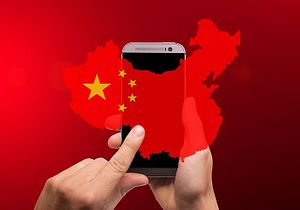Taiwan President Tsai Ing-wen often attempts to defuse tensions with Beijing by calling for dialogue between people on both sides of the strait. Chinese bans on tourism, international students, and free access to the internet usually make this impossible.
That changed dramatically last week thanks to the audio-chat app Clubhouse, which was blocked by Chinese authorities on February 8 after exploding in popularity among Chinese-language users eager to discuss topics both mundane and politically sensitive.
The touchier subjects – including chat rooms where users from China, Taiwan, Hong Kong, and elsewhere engaged in deep discussions of identity, cross-strait politics, and their mutual perceptions of each other – drew both the ire of the Chinese government and the attention of the world, unused to hearing Chinese voices expressing their unfiltered opinions.
Clubhouse gained traction as an invitation-only service marketed toward exclusive interactions with celebrities, such as listening to Elon Musk and Robinhood CEO Vlad Tenev chat during the apex of the GameStop stock craze.
But an unexpected surge of popularity among users in East Asia, especially within China, suddenly made the platform into a host for discussions on topics such as the internment camps of Xinjiang and the Hong Kong protests, giving Chinese internet users the chance to chat directly with dissidents such as the political cartoonist Badiucao and the artist Ai Weiwei.
In some chat rooms, Chinese and Taiwanese users discussed Taiwan’s democracy and the cross-strait acrimony that has increased under Chinese leader Xi Jinping, whose government insists it plans to make Taiwan into a part of China.
Such discussions have become rarer under Xi’s rule. China cut off all government-level dialogue with Taiwan after Tsai took office, replacing her more Beijing-friendly predecessor. The number of Chinese students studying in Taiwan had already been steadily decreasing before China placed new restrictions on its citizens traveling or studying in Taiwan.
At the same time, the 2019 protests against Hong Kong’s anti-extradition law received broad support in Taiwan, which saw them as a symbol of the existential threat Beijing poses to their own democracy, deepening fissures between the people of China and Taiwan in the process.
When Clubhouse was blocked in China on Monday, thousands of users gathered in one chatroom to share their memories on the platform; one Chinese user spoke of the lessons he had learned by listening to Taiwanese share their experiences.
The app was not exactly universally accessible in China – and the Chinese government ban will not keep all users from accessing it.
Clubhouse has only been released for iPhone users and was not made available to users with Chinese Apple accounts, making it far more likely Chinese users were those who had lived or studied abroad. Despite the block, many Chinese users continue to access the app using VPNs.
And the audio-chat mania in China is far from over. Several similar apps are already being developed, even as there’s skepticism the model can be successful there in the long term as it relies on conversations that flow organically in real time – a censor’s worst nightmare. Voice chat apps have failed to take off in the past in China.
Clubhouse itself is powered by the Chinese technology startup Agora. The co-founder of Agora insisted the company does not store any end-user data after users raised security concerns.

































